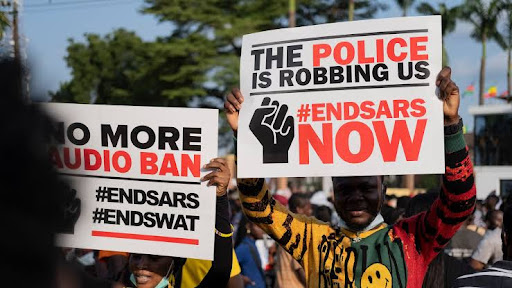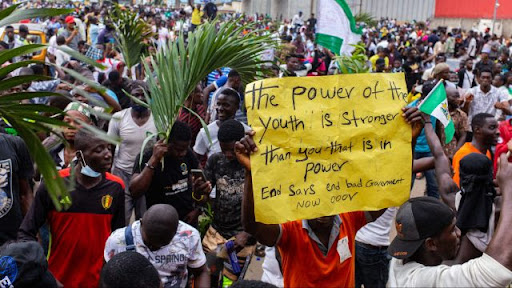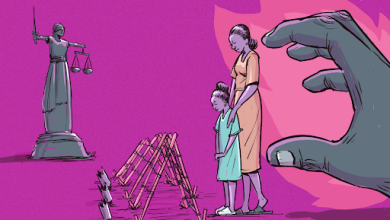#EndSARS: Has Nigeria Witnessed Improvements In Policing?
A nationwide protest for better policing and good governance was met with brute government force and an eventual promise to meet protesters' demands in October 2020. What has changed over the last one year?

In Oct. 2020, Nigerian youths took to the streets to protest against brutality reportedly carried out by Special Anti-Robbery Squad (SARS), a unit of the Nigeria Police Force set up in 1992 to combat armed robbery in the country, but who have been said to have morphed into the harassment of citizens, carrying out extrajudicial killings and extortion at gunpoint.
Although some Nigerians had long clamoured for the ban of SARS, the incidence of Oct. 4, 2020 where two of its officers, in a viral video, purportedly killed a man and took away his car, reawakened the #EndSARS trend on Twitter where it gradually grew to a full blown national protest.

In response, the Nigerian government rather used military force on unarmed protesters. HumAngle detailed the various scenarios of violence, protests, demands and response of the Nigerian government in multiple reports.
Many citizens and security personnel were killed, properties burnt and looted, while bank accounts of some youths were frozen alongside a series of illegal arrests, detention, and torture of protesters. Some are yet to be released till date.
#EndSARS demands and the changes it brought
In meeting the five demands of the protesters, Mohammed Adamu, the then inspector-general of police, dissolved SARS 48 hours after protesters flooded the streets.
However, the protesters did not back down from the protests because they felt that the ban by the IGP might not be different from the several disbandments of the unit in past years, after which they always resurfaced.
Their requests included compensations for the families of those who died under police brutality, release of arrested protesters, and an increase in the salaries and allowances of police officers.
Also, that an independent body be set up to investigate allegations of police misconduct and prosecute those indicted. In addition, they demanded the psychological evaluation of officers of the disbanded outfit before they are redeployed into other units.
What has changed institutionally?
Nigeria’s President Muhammadu Buhari, in his 2021 new year address, restated his administration’s commitment to fulfilling the five demands of the #EndSARS protesters.
“This government heard, this government listened and this government is committed to fulfilling the five demands of our youths, fully understanding that we all wish well for Nigeria,” Buhari said.
The government, in implementing some of the protesters’ demands, had created a new unit, Special Weapon and Tactical Team (SWAT), to replace SARS. The new unit started training while the protest persisted in Oct. 2020. It had also set up Judicial panels across the nation to look into the reports of massacre at Lekki Toll Gate in Lagos on Oct. 20, 2020, along with other extrajudicial activities of the Police and military.
Despite the promises, many Nigerians still fall victim to brutality and harassment by the police force. A police officer identified as Okocha Love, recently reportedly harassed a student of Lagos State University.
According to the victim’s statement in a video that went viral on Friday, Oct. 1 2021, the officer stopped their car and searched her bags based on the suspicion that she was in possession of hard drugs.
Then the officer requested she follow her to the station even when nothing was found. When she refused, she was dragged to Ayobo police station where she was beaten by the police in a cell.
The state’s response suggests that there has been little to no institutional reform since the protests.
In a Sept. 2021 report by Foundation for Investigative Journalism, police officers attached to Operation Puff Adder in Yenagoa, Bayelsa State capital, South-south Nigeria, tortured 27-year-old Goodluck Oviekeme to death for an alleged crime. There was no proof and standard interrogation procedure was not adhered to.
The report said that when the state Police Public Relations Officer (PPRO), Asinmi Butswat, was asked why the deceased was not charged to court within 48 hours of arrest, the PRO said the constitutional rule does not apply to all cases.
Human rights lawyer, Kemi Balogun* expressed shock over the PRO’s statement and described it as absurdity arising from lack of adequate knowledge of the law.
“It is a shame that a whole police public relations officer of a state could utter such a statement which stands in sharp contradiction with the provisions of the Nigerian 1999 constitution (as amended),” she said, adding that this was why there was widespread violations of human rights in the force.
“Right to trial is a constitutional rule guaranteed under chapter IV of the constitution. Note that the law by virtue of Section 1, stands supreme above all persons [including the president] and authorities throughout the Federal Republic of Nigeria,” she said.
The reported measures taken against arrested suspects defy laid down constitutional provisions on right to dignity of the human person, which states that no one is to be subjected to torture of any kind, not even a suspect. The deceased’s rights to fair hearing and presumption of innocence were also disregarded by the police.
Police extortion persist
On Thursday Sept. 23, police officers from Ilasan police station, Lekki, Lagos State, Southwest Nigeria reportedly extorted a man of about N200,000 after seizing his phone, invading his privacy, and even shooting into the air to intimidate him.
The Police officers had a Personal Point of Service (POS) terminal used to effect the extortion.
Human rights enthusiast and lawyer, Ridwanullah Olayemi, reacting to the news wrote, “Every Nigerian, even if he is accused of committing crimes deserves the right to be heard, not to be extorted, intimidated or brutalized. We need to be able to trust the Nigerian Police to protect citizens instead of harming them.”
Sexual assault by police officers
One Corporal Chinedu Nwachukwu, a police officer allegedly attached to the Rapid Response Squad in Aba, Abia State, Southeast Nigeria in Sept. 2021, was arrested for the alleged rape of a student of Aba Polytechnic. This led to a protest by students of the institution.
While the students demanded undelayed justice, it was gathered that officers of the Nigerian police dispersed them from the Aba-Owerri road, an act that shows that security forces continue to show no accountability.
According to the Governor through a statement signed by the Chief Press Secretary, Mr Onyebuchi Ememanka, as reported by Vanguard, “Shooting at unarmed students who were protesting the alleged sexual assault of one of them by a police officer is against all known and recognised rules of engagement by law enforcement officers who could have employed other means other than deadly force to disperse the protesting students,” the statement read.
About 300 #EndSARS protesters still held in detention
Mr Adesina Ogunlana, the Co-convener of New Nigeria Network (NNN), a civil society group and a counsel at the #EndSARS judicial panel, called out the Lagos State government and authorities to unconditionally release 300 #EndSARS protesters in detention or charge them to court.
In a report by Vanguard, Ogunlana interacted with the detained protesters during his visit to the Lagos prison in August 2021 and lamented over its congested state.
“Hundreds of citizens who were arrested as ‘#EndSARS protesters criminals’ by security agencies are languishing in prisons, with none of them undergoing trial at the courts,” he pointed out.
Kemi Balogun also attributed the persistent corrupt practices of the Police to poor welfare programs by the Nigerian government and corruption within the Police trust fund.
“One of the demands of the protesters last year was to review police salaries and remuneration so as to discourage extortion occasioned by hunger by police officers. Rather than look into it, the government jettisoned it and only bluffed in papers,” Kemi said.
Asterisks are used to protect the identities of respondents.
Support Our Journalism
There are millions of ordinary people affected by conflict in Africa whose stories are missing in the mainstream media. HumAngle is determined to tell those challenging and under-reported stories, hoping that the people impacted by these conflicts will find the safety and security they deserve.
To ensure that we continue to provide public service coverage, we have a small favour to ask you. We want you to be part of our journalistic endeavour by contributing a token to us.
Your donation will further promote a robust, free, and independent media.
Donate HereStay Closer To The Stories That Matter




